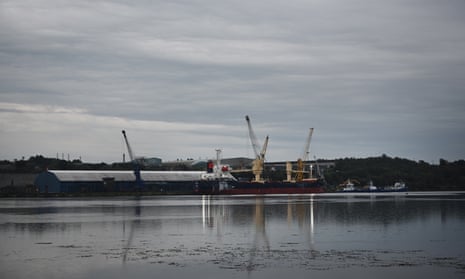Angry dockers have vowed not to unload cargoes of Russian oil and gas, as it emerged that shipments were en route to British ports because of an apparent loophole in a government ban and could even be used to heat UK homes.
The government imposed a ban on Russian vessels docking in the UK on Tuesday, in response to Vladimir Putin’s invasion of Ukraine.
The transport secretary, Grant Shapps, said that UK ports would refuse access to “all ships with any Russian connection whatsoever”.
However, the Department for Transport confirmed the ban did not cover the origin of cargo, including oil and gas that may ultimately have been bought from Russian state-owned entities.
On Wednesday, it emerged that at least two ships containing Russian oil and gas were due to dock in the UK.
About 180 members of the trade union Unison said they did not want to touch cargoes of liquefied natural gas (LNG) believed to be on the way from Russia.
Unison said two LNG tankers, the Fedor Litke and the Boris Vilkitskiy, were on their way with Russian gas, and were due to unload at the Isle of Grain terminal, near London, on Sunday. The ship tracking website MarineTraffic appeared to show the Fedor Litke had turned around, while the Boris Vilkitskiy was sailing south, off the west coast of Norway.
Both ships are owned by the Greek firm Dynagas but the owner of the cargoes was not publicly disclosed. The Boris Vilkitskiy is managed by Yamal LNG OAO, a Russian company.
A well-placed source told the Guardian that at least one of the ships is carrying LNG purchased by British Gas owner Centrica, which vowed to cut off supply lines from its Russian state-owned partner Gazprom earlier this week.
A Centrica spokesperson said it was “also in discussions with the government about how to handle any LNG shipments which are already in transit”.
If the LNG were to be loaded at Grain and delivered to Centrica, which owns British Gas, it could end up heating British homes.
Unison called on Shapps to expand the ban to prevent the two ships from docking at the Isle of Grain terminal, which is operated by the power networks company National Grid in the Thames estuary.
“The workers at the National Grid terminal don’t want to touch the cargo given the tragedy unfolding in Ukraine,” said the union’s Matt Lay. “These staff are determined to show their support for the Ukrainian people and uphold the sanctions imposed against Russia.”
On Tuesday, as the law banning Russian ships from British ports was being passed, a third ship, the Pluto, was moored at Milford Haven in south Wales and was scheduled to dock next in Derry.
According to MarineTraffic, the 184 metre-long vessel was under way in the Irish Sea on Wednesday evening, with a scheduled arrival time at the city’s docks, known as Foyle Port, of 8pm.
Quick GuideThree ways you can help the people of Ukraine from the UK
Show
Support local charities
There are several Ukrainian charities working on the ground. Sunflower of Peace is a charity that helps paramedics and doctors, and has been fundraising for supplies, which includes first aid medical tactical backpacks.
United Help Ukraine focuses on providing medical supplies and humanitarian aid, and raising awareness of the conflict.
Voices of Children aims to help children affected by the war in eastern Ukraine, providing support through art therapy, psychologists, video storytelling and a number of other methods.
The British Red Cross has launched an emergency appeal to help Ukraine. The charity will be updating its webpage with news on the work its team is doing, and how support will be used to help people.
Support local journalism
English-language news outlets based in the country, such as Kyiv Independent and the New Voice of Ukraine, are covering developments on the ground as the conflict unfolds, using local journalists. The Kyiv Independent says it was created by journalists in order to defend editorial independence. This site on Twitter covers many local journalists in Ukraine.
Write to your local MP
This can be a way to lobby the British government to place further sanctions on the Russian government and its associates. You can get in touch with your local MP via email or post to their constituency address. Instructions on how to get in touch can be found on parliament.uk.
The Guardian understands that Foyle Port expects to receive the vessel and does not believe the ban covers the Pluto. The vessel is bringing crude oil from Primorsk terminal, near St Petersburg, which accounts for 30% of oil exports from the country.
Colum Eastwood, the MP for Foyle, said: “This vessel, which contains Russian goods cargo, is not welcome and should not be allowed to make land in Derry.
“It runs contrary to the spirit of the sanctions which have been introduced to bring pressure to bear on Putin’s regime to end the outrageous invasion of Ukraine.
“The people of Derry stand in solidarity with the people of Ukraine who are enduring unimaginable suffering at the hands of Putin’s forces. I have been in touch with the Port to offer assistance through my office to ensure that the spirit of the sanctions are upheld and that the vessel is prevented from docking in Derry.”
MarineTraffic data says the Pluto is owned by Tufton Oceanic Ltd, a company based in London but owned via a Cyprus entity.
On Monday, Shapps, wrote: “The maritime sector is fundamental to international trade and we must play our part in restricting Russia’s economic interests and holding the Russian government to account.
“In these circumstances the Department for Transport does not consider it appropriate for Russian vessels to continue to enter UK ports.”
The Pluto is registered with the Marshall Islands and flies the Pacific archipelago’s flag.
The Guardian has approached National Grid, Dynagas, Foyle Port and Tufton Oceanic for comment.
